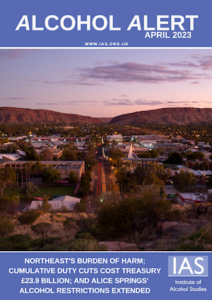In this month’s alert
The northeast’s burden of harm, and the cost of alcohol-related cancer deaths in Europe
Joining our podcast this week is Susan Taylor, Head of Alcohol Policy for Fresh and Balance in the northeast. We discussed the burden of alcohol-related harm in the northeast of England, and how the region still experiences disproportionate harm compared to other English regions.
Taylor explained that alcohol harm doesn’t need to be a political issue, and that whatever happens in the next General Election, any government should look at the evidence base and commit to policies to prevent further harm.
Listen to the end of our podcast, where you can hear from Dr Harriet Rumgay about her recent study on the economic cost of deaths from alcohol-related cancer in Europe.
Cumulative cuts to duty will cost the Treasury £23.9 billion
A recent IAS Budget Analysis shows that freezes and cuts to alcohol duty will cost the UK Treasury over £23.9 billion from 2013 to 2028.
Figure 1: Cumulative and annual impact of alcohol duty cuts since 2012 on government finances (£billions)

In the Spring Budget 2023, most alcohol duty was increased with inflation for only the second time in a decade. The Treasury and Office for Budget Responsibility assume that alcohol duty will go up with inflation each year, so that it does not lose value in real-terms.
Despite the rise, cumulative cuts and freezes mean that alcohol duty will still be much lower than in 2012-13. For instance, beer duty will be 29% lower and spirits duty 23% lower. This has already contributed to alcohol becoming much more affordable, leading to an increase in alcohol-related deaths and hospitalisations. Between 2012 to 2019, cuts are estimated to have led to 2,223 additional deaths in England and Scotland.
In the Budget, draught duty rates were treated differently to off-trade duty for the first time, in an attempt to reduce the widening gap between on and off-trade alcohol prices. The following figure shows this departure from the norm.
Figure 2: Real duty rates, indexed: 2012/13=100
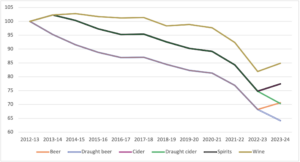
This difference in treatment is part of the Reform of Alcohol Duty, which will commence in August 2023. Under the new system, all products will be taxed based on their strength. IAS supports the shift to a more proportionate system, however, we have a number of concerns and recommendations:
- The rates are set too low – they should at least cover the £27 billion cost of alcohol harm to society
- Cider is still being preferentially treated with lower rates than the same strength beer, which is likely to continue to cause harm. They should be equalised
- Duty should be de-politicised and automatically uprated in line with inflation or earnings yearly, instead of being considered at each Budget
Read our Analysis for more information.
Scottish alcohol marketing restrictions to be reassessed and Deposit Return Scheme delayed
The new First Minister of Scotland, Humza Yousaf, has announced that plans to restrict alcohol marketing will be taken “back to the drawing board”.
Speaking in the Scottish Parliament, Yousaf said that, although he wholeheartedly agrees that alcohol marketing should be restricted, the proposals have caused real concern to an industry facing challenges on multiple fronts. He said that he wants to avoid undermining the alcohol industry and hospitality sector, and will therefore discuss plans with the industry and public health, in order to “agree a new set of proposals”.
In response, Alcohol Focus Scotland – who were involved in developing the proposed restrictions – pointed out that the industry’s concerns should be “subject to careful scrutiny”, as they haven’t played out in the past, such as with minimum unit pricing.
In the Telegraph, Mark Kent of the Scotch Whisky Association, said:
“The Scotch whisky industry is aligned with the Scottish Government on reducing alcohol misuse. But the sweeping proposals set out in last year’s consultation would have distracted from that goal and would have caused unnecessary damage to the Scottish economy and society.”
In related news, Yousaf delayed the implementation of the Deposit Return Scheme, which was planned to start in August 2023. The scheme aims to increase the number of single use drinks containers that are recycled.
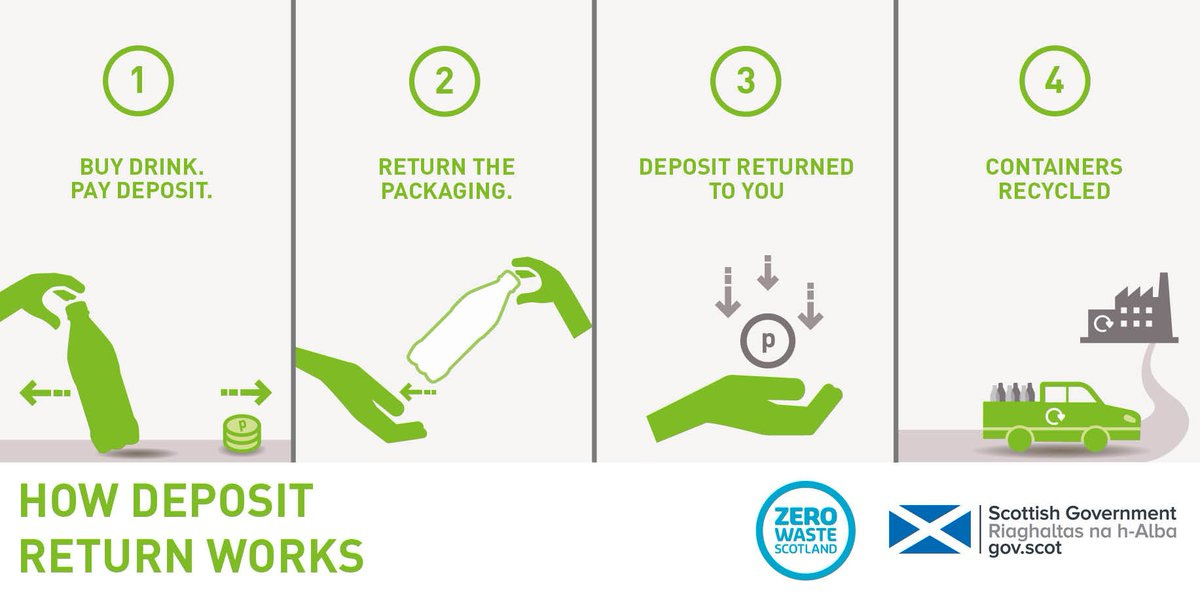
The drinks industry has been very vocal about the scheme. The Scotch Whisky Association says it supports the scheme, but that in its current form it would “hamper the efforts of businesses across the country to reduce waste and bring about a more circular economy”.
The Night Time Industries Association said the scheme continued to be “fundamentally flawed and completely unworkable for large parts of our sector” and that a total redesign was needed.
At the same time as the industry has been lobbying against various regulations, over 30 charities signed a letter calling for better access to recovery services and an increase in the minimum unit price of alcohol in Scotland.
Speaking to the BBC, the chair of SHAAP – Dr Alastair MacGilchrist – stated that he doesn’t think people know how much alcohol harm has increase during the pandemic:
“Alcohol treatment services have diminished over the last few years. There is a real need to crank them up in quality and quantity so that people who are suffering from alcohol problems can get the help they need.
“We must redouble our efforts to reduce the amount people drink. We can enhance existing measures such as minimum unit pricing and introduce further measures such as restricting marketing.”
Hear whisky, think vodka
The Scotch Whisky Association (SWA) launched a campaign called ‘Keep The Commitment’, which calls on the UK Government to “uphold its pledge” to support Scottish whisky and gin producers. It calls for a reversal of the decision to increase duty on spirits by RPI inflation.
The SWA’s chief executive, Mark Kent, said it is disappointing that the industry seems to be taken for granted:
“We want the UK government to understand what choosing to impose a double-digit duty hike will do to the industry, hospitality businesses and consumers. And we want MPs to support Scotch whisky, including in the vote on the tax increased proposed by the chancellor.”
The campaign, which the SWA says will run through the summer until August, when duty is planned to increase in nominal terms, led to SNP and Liberal Democrat Scottish MPs tabling amendments to the Finance Bill, to try to freeze duty. These were rejected in a Commons vote, with Treasury Minister James Cartlidge stating that the amendment “would cost in the range of £1.7 billion to £2 billion”, and stating that they need to run things in a stable way.
Discussing the amendment brought my Liberal Democrat MP Alistair Carmichael, Cartlidge said:
“I totally understand where he is coming from, but he hasn’t persuaded me that he has an idea on where to find the billions of pounds from.”
Health Secretary turned First Minister turned whisky lobbyist

Humza Yousaf – whose previous position was Scottish Health Secretary – met UK Prime Minister Rishi Sunak on 24 April and called for Scotch whisky to be treated “fairly” instead of receiving “disproportionate” tax rises:
“Yet again, [the UK Government] are denying a key Scottish industry the support it needs – support the drinks industry in the rest of the UK receives – while hammering them with a tax increase at the same time. That’s blatantly unfair to whisky and blatantly unfair to Scotland.”
After the meeting, Yousaf’s spokesperson said Yousaf “was pleased that the prime minister committed to fairness in how the Scotch whisky industry is treated by the UK government. He now needs to deliver on that”.
SHAAP responded to news of the meeting by stating that Yousaf’s criticism of the duty increase is “inconsistent” with Scottish Government policy. SHAAP’s director, Elinor Jayne, said:
“By acting as the Scottish Whisky Association’s spokesperson in Westminster, the First Minister is undermining his own stated aim of taking ‘preventative action to reduce alcohol harm’.
“And given only 1% of Scotch whisky is sold in Scotland, the duty hike will have a miniscule impact on the industry, if any.
“I would urge the First Minister to build on progress made with MUP, stick to his guns and not fall for the hyperbole of alcohol industry agitators.”
A February report by the Social Market Foundation (SMF) found that 99% of Scotch whisky is exported. Therefore, almost all whisky produced in Scotland will not pay UK duty.
So why does the SWA care about duty that barely affects whisky? A number of major alcohol producers, including Diageo, are members of the SWA, who manufacture many other products than whisky, such as vodka. Vodka is consumed in Scotland much more than whisky, and will therefore be affected by duty rises. So the SWA’s lobbying to freeze alcohol duty isn’t necessarily about whisky, but vodka. Whisky is used in its public relations activity to evoke romanticised imagery of idyllic highland distilleries. As Dr Aveek Bhattacharya of SMF wrote recently:
“Marketers are good at spinning romantic yarns, playing up the traditional image of Scotland as a country of tartan, heather and, yes, whisky. But good public policy needs to be founded in realism – recognising the Scotland that actually exists, a place of vodka drinkers and chronic public health problems. Changing that won’t hurt the economy, but it might save some lives.”
Interestingly, producers could choose not to pass duty increases on to customers in the way of price increases. The Wine Society has decided to absorb increased duty, while encouraging members to purchase more bottles to help cover the costs.
Alice Springs alcohol restrictions extended

The Government in Australia’s Northern Territory (NT) has extended a three-month trial of alcohol restrictions in the town of Alice Springs by an additional three months.
The town – which has a population of 25,000 – has experienced significant issues with alcohol and other drugs in the past, particularly linked to violence and crime.
Last year, alcohol restrictions were lifted and violence subsequently increased. There is evidence from leaked hospital data that the recent three-month ban led to alcohol-related hospital admissions dropping by more than half.
At a similar time, a study was published that found minimum unit pricing was associated with a 14% reduction in alcohol-related assaults in Darwin and Palmerston in the NT (recorded by police). Significant reductions were also found in Alice Springs and across the whole of the NT.
How alcohol harms intimate partner relationships
A report by the Alcohol & Families Alliance has found extensive harm to intimate relationships caused by drinking, even among people who are not alcohol dependent or do not drink regularly.
The publication – Alcohol and Intimate Partner Relationships – gives insight into the main reasons for people changing their drinking habits, such as dealing with divorce, retirement, using alcohol to cope with poor mental health, or due to the normalisation of alcohol in social, sporting and professional settings.
92% of respondents said that their partner’s drinking had caused conflict or tension. Respondents pointed to a number of day-to-day implications of their partner’s drinking, including: increased financial issues, avoiding events that involved alcohol, and having to take on additional responsibilities with childcare and housework due to their partner not being able to.
Among the negative effects cited, the most common was a breakdown of trust, which contributed to feelings of isolation, anxiety and mental health issues.
At the launch of the report in parliament, George Freeman MP – who sponsored the event – highlighted the impact that a loved one’s drinking can have, and how important it is for real stories to be told about alcohol’s harm to other.
Alongside recommendations for service providers and researchers, the Alliance calls on the Government to:
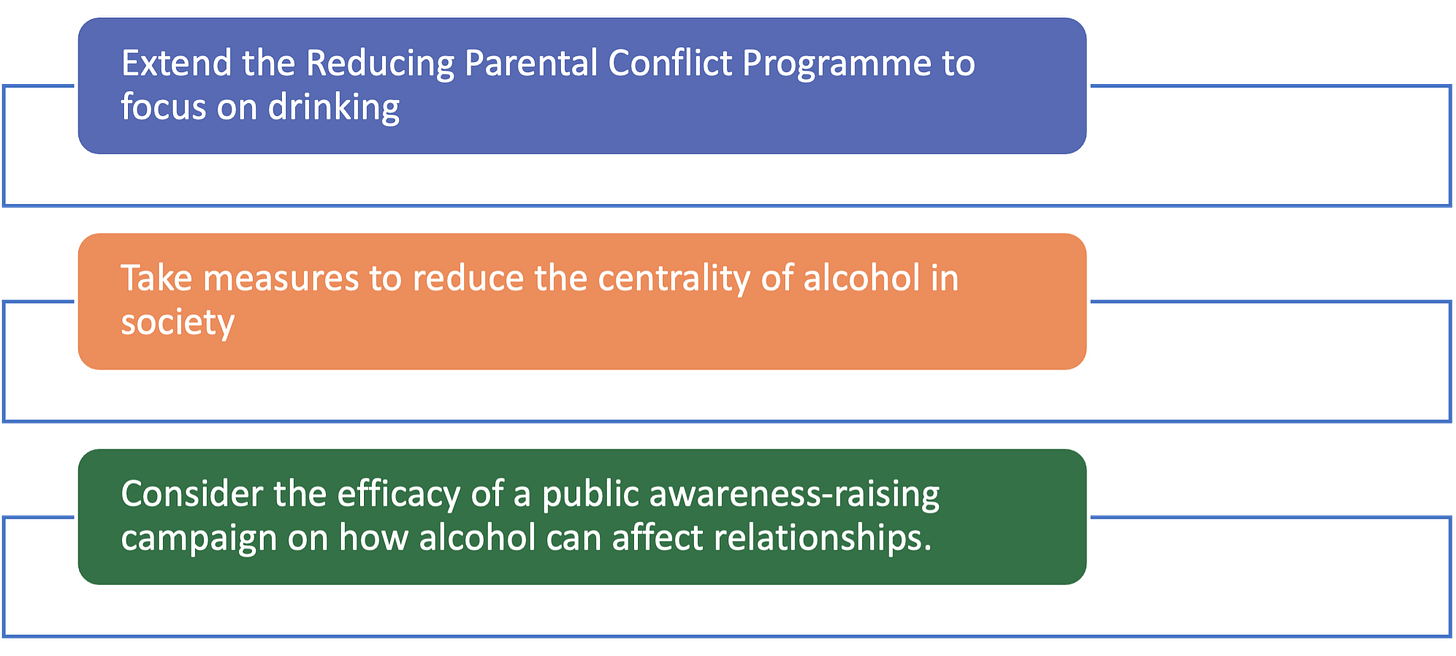
Prevention is better than cure
The Health and Social Care Select Committee has announced the ten workstreams that they will be exploring during an inquiry into prevention, with ‘Alcohol, drugs, gambling and smoking’ being one of the workstreams.
The ten subjects were selected after the Committee asked for submissions, with over 600 submissions being sent from researchers and organisations involved in preventative care.
In the alcohol, other drugs and gambling submissions, population-level interventions were emphasised above targeted measures. In addition, the effectiveness of current regulations and the role of the private sector were both highlighted.
A question of sport
Women’s football club Glasgow City has given its support to the ‘Calling Time’ campaign by SHAAP, which “aims to encourage the Scottish Government to ban alcohol sponsorship and marketing in sport”.
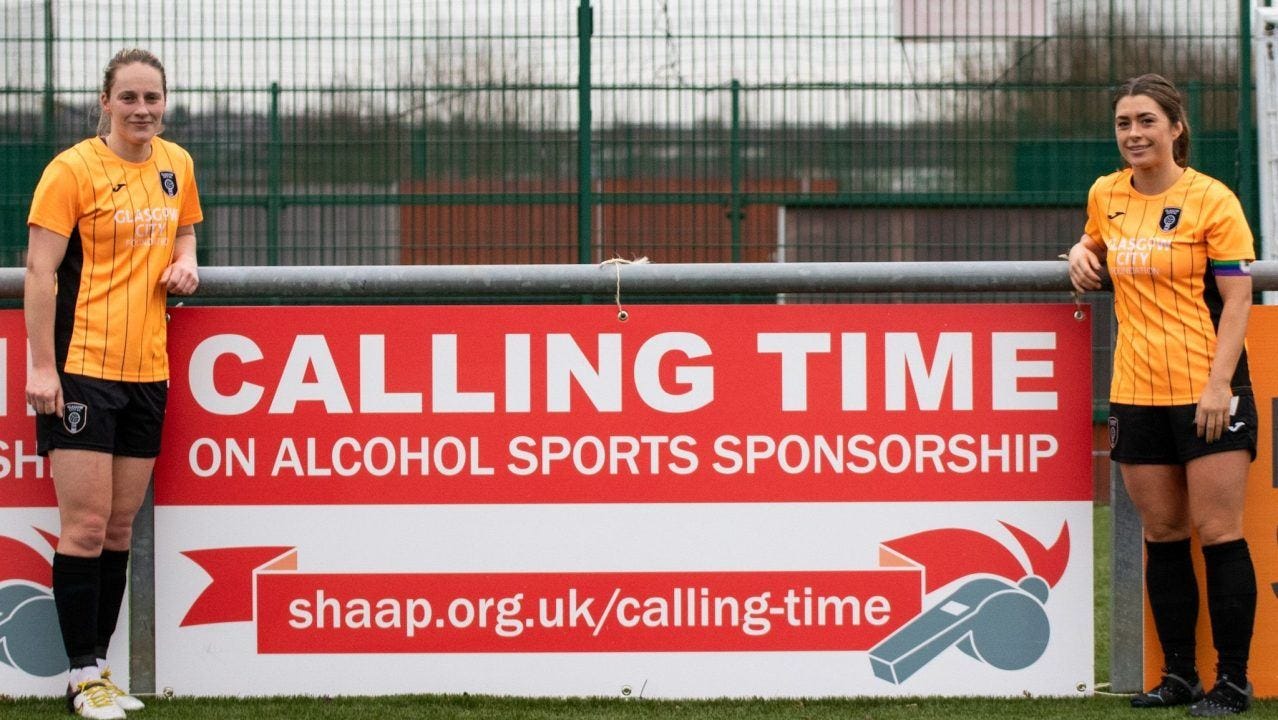
As well as a number of public health charities, supporters of the campaign include Scottish Women’s Football, and the clubs Boroughmuir Thistle and Stenhousemuir.
The chief executive of Glasgow City, Laura Montgomery, said:
“As a club, our entire ethos is built around championing women and girls and we see no place for alcohol sponsorship at our matches or indeed at any football matches.
“We want to get more people active, fit and healthy. We know our game attracts families and young people and our role as a club is to be a positive influence on our followers the best that we can.
“In no way does alcohol promotion align with this and we hope as many other clubs as possible sign up to back the campaign.”
Elinor Jayne, director of SHAAP, commended the clubs and said:
“Football and sports clubs must recognise their responsibility to fans and the wider public to end the promotion of health harming commodities such as alcohol.”
Meanwhile, clubs in the English Premier League have agreed to withdraw gambling sponsorship from the front of their matchday shirts by the end of the 2025-26 season.
However, advertising will still be able to feature on shirt sleeves and LED advertising around pitches. The announcement followed a consultation between the league, clubs and the Department for Digital, Culture, Media & Sport.
Gambling with Lives, a community of families bereaved by gambling-related suicide, said the announcement was “not perfect by any means, but a welcome move and significant acceptance of the harm caused by gambling advertising and sponsorship”.
Greg Fell, vice president of the Association of Directors of Public Health, was critical of the decision, as he said it has the potential to do more harm than good if it gives the impression that harm is sorted and “dampens public outrage at government inaction”.
Voluntary restrictions relating to alcohol have been found to delay or prevent the implementation of more effective control measures.
Industry framing of record high alcohol deaths
2021 saw the highest number of alcohol-specific deaths in the UK on record; a 27.4% rise on 2019 figures and a 7.4% increase on 2021. Preliminary figures discussed on Newsnight on Wednesday 26 April suggest that 2022 continued to see a rise in deaths (skip to 14:00mins).
Despite this crisis of spiralling deaths, a commentary in The Lancet found that the industry-funded body the Portman Group (PG) has been telling a different story.
Dr Nason Maani (University of Edinburgh), Dr May van Schalkwyk and Prof Mark Petticrew (LSHTM), write that PG’s communications instead focus on the majority of people drinking ‘responsibly’, and how PG’s actions have contributed to a decrease in consumption and harm over the past decade.
A recent publication by the World Health Organization states that:
“The vague notion of “responsible drinking” that is actively promoted by alcohol producers and marketers, does not define when to stop drinking or suggest the option of not drinking.
“It does, however, create a mistaken impression that the alcohol industry is part of the solution to harms from drinking rather than a driver of the problem. Moreover, the moralizing tone implicit in “responsible drinking” messages ignores the inherent risks in consuming alcohol.”
In the Lancet commentary, the authors write that PG’s framing of ‘responsible drinking’ implies a minority are irresponsible and therefore to blame for their susceptibility.
They draw attention to a specific comment that PG made in the wake of the release of the 2021 alcohol death figures. PG said this was only due to a small group of drinkers and that therefore targeted, health-focused action is needed. The authors say this ignores the overwhelming evidence of population level measures and the disproportionate reliance the industry has on revenue from harmful drinking.
The authors write that:
“These record alcohol deaths are a reflection of greater alcohol sales among individuals at the greatest risk, facilitated by the obstruction of evidence-based policy.
“The UK is in need of a new alcohol policy to reduce alcohol-specific and alcohol-related mortality. For it to be effective and equitable, the industry and the organisations it funds can have no part in writing it. The UK public deserve nothing less.”
Alcohol Toolkit Study: update
The monthly data collected is from English households and began in March 2014. Each month involves a new representative sample of approximately 1,700 adults aged 16 and over.
See more data on the project website here.
Prevalence of increasing and higher risk drinking (AUDIT-C)
Increasing and higher risk drinking defined as those scoring >4 AUDIT-C. A-C1: Professional to clerical occupation C2-E: Manual occupation
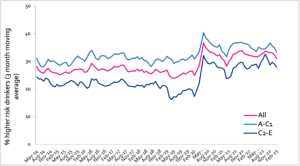
Currently trying to restrict consumption
A-C1: Professional to clerical occupation C2-E: Manual occupation; Question: Are you currently trying to restrict your alcohol consumption e.g. by drinking less, choosing lower strength alcohol or using smaller glasses? Are you currently trying to restrict your alcohol consumption e.g. by drinking less, choosing lower strength alcohol or using smaller glasses?
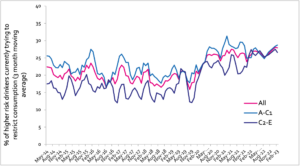
Serious past-year attempts to cut down or stop
Question 1: How many attempts to restrict your alcohol consumption have you made in the last 12 months (e.g. by drinking less, choosing lower strength alcohol or using smaller glasses)? Please include all attempts you have made in the last 12 months, whether or not they were successful, AND any attempt that you are currently making. Q2: During your most recent attempt to restrict your alcohol consumption, was it a serious attempt to cut down on your drinking permanently? A-C1: Professional to clerical occupation C2-E: Manual occupation
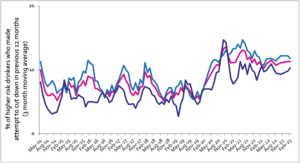
Podcast
Our monthly podcast features interviews with experts from across the sector.
Gambling industry harms and parallels with the alcohol world
Will Prochaska –
Coalition to End Gambling Ads

